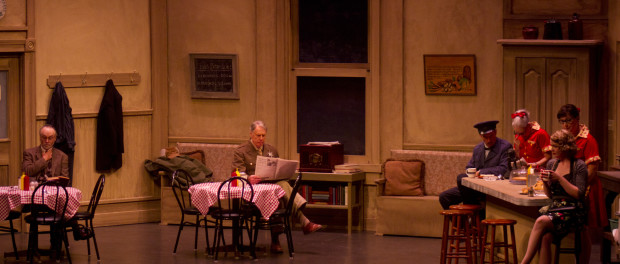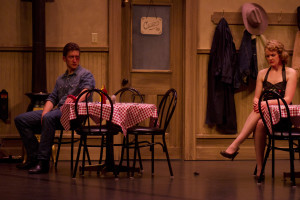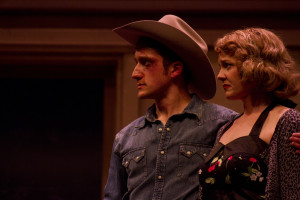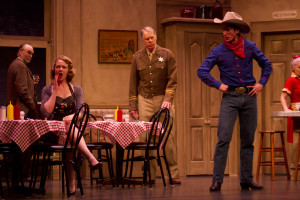Next Stage Repertory Co’s Bus Stop

(L to R) Dr. Gerald Lyman (Ric Hagerman), Sheriff Will Masters (Jack Seybold), Bus Driver Carl (Joe Charter), Restaurant Owner Grace (Presila Quinby), Waitress Elma (Marlena Gray) and Wanna-be Chanteuse Cherie (Stephanie Jones) in Next Stage Repertory Company’s production of William Inge’s “Bus Stop”.
Bus Stop: William Inge’s Romantic Comedy Laced With Melancholy Lonely Souls
– by Lee Greene
Bus Stop, a play written by William Inge in 1955, is being presented on the stage of the Craterian Theater in Medford, for two weekends in September. It’s a Next Stage Repertory Company production, which is a homegrown Rogue Valley theatrical organization (not one of the touring shows that most commonly frequent that stage). The production is an interesting revival of an equally interesting, but dated show.
To quote Vincent Canby, reviewing an earlier revival of the play for The New York Times: “Inge dramatized the melancholy, the humor and the unconscious gallantry of commonplace characters. He saw them mostly in economically depressed but sexually charged circumstances. . . .” [Vincent Canby, The New York Times, THEATER REVIEW; Inge’s Bus Passengers, Stranded Overnight, February 23, 1996] The basic plot is that in 1955, a bus is stranded by a snowstorm in a small town 40 miles west of Kansas City. The driver and four passengers spend most of the night in a small roadside restaurant, thrown in with the proprietress, a waitress, and the wizened local sheriff. Borrowing from an earlier review, by the great Brooks Atkinson, of the original Broadway production: “What the strangers say and do during the night is extremely funny. . . . Mr. Inge has written it in a lusty style.” [Brooks Atkinson, The New York Times, Mr. Inge in Top Form: Bus Stop a Bustling Comedy With an Idea, March 13, 1955] “Mr. Inge has collected some vigorous characters. For the most part they are unsophisticated people with emotions close to the surface.” [Id.] “Bus Stop can be accurately described as a fugue whose themes are the various aspects of love.” [Vincent Canby, The New York Times, THEATER REVIEW; Inge’s Bus Passengers, Stranded Overnight, February 23, 1996]
Inge gives us as the two principal characters, 1) Bo, a brash, headstrong, unworldly, unsophisticated, naïve young cowboy/ranch owner from Montana, who has just lost his virginity to 2) Cherie, an equally unworldly, but far from innocent, pretty, footloose, young aspiring nightclub singer, who has never actually advanced her career beyond the seedy local dives of Kansas City. Having consummated their relationship, in his mind, Bo whisks Cherie onto the bus with plans of marital bliss in Montana, but without ever bothering to ask Cherie if she shares the feeling and is agreeable to pursuing those dreams. In other words, he basically kidnaps her against her will. Turned loose in the diner, she protests her unwilling travel and fate, where she is comforted and aided by Virgil, Bo’s traveling companion, an older, wiser, surrogate father to Bo, and by Will Masters, the tough as nails, good-hearted, and thoroughly Christian (YEA!) local sheriff. Bo, for his part, just cannot comprehend what the problem is – having consummated their love, what’s left but a future of marital bliss on the ranch? Inge throws two more pair of romantic entanglements into the restaurant for the evening. The bus driver, Carl, happens to have an ongoing, purely sexual, “passing through the night” relationship with Grace, the fortyish, hard bitten, but still good looking, “grass widow” proprietress of the restaurant. And the bus also brings Dr. Gerald Lyman, the articulate, scholarly and charming, but licentious, alcoholic and self-absorbed sacked college philosophy professor to the restaurant, where he charms and importunes Elma, the young, naïve, and impressionable high school girl working as a waitress.
I won’t explicate the whole plot – go see the show and enjoy it as it unfolds. I do have several things to say, however. First, the play really is dated. What goes on in that restaurant that night among the stranded passengers is an utterly different world than the one we’re presently living in. It was a simpler, more innocent age, in which a collection of desperate, lonely strangers, stuck in the barren expanse of the 1950’s American dustbowl overnight, faced with nothing else to do, are forced to entertain and pursue each other. If the bus were idled by a snowstorm today, the passengers would be sitting at the bar watching cable news or ESPN sports, and whipping out their smart phones to chat, text, play games, read something interesting, or “browse the net”. The strangers might never even talk to one another, and if they did, it’d be about whatever they just saw on the big screen TV; “Can you believe Donald Trump really said that?”
Secondly, as more renowned reviewers than me have pointed out, Inge presents a poignant mixture of angst and comedy. Inge lived a difficult childhood and an even more difficult adult life, as a closeted homosexual, in an era where that was not acceptable and to be found out was to be persecuted, a life ending in a suicide by asphyxiation. So Inge was well acquainted with loneliness, isolation, and desperation, and thoroughly imbued his characters with that dark impulse. His plays, despite the overt comic situations and repartee, are fraught with existential desperation, and none more so than this one, Bus Stop. It’s a tricky business navigating that mélange and finding the right line between comedy and anguish.
Which brings us to the Next Stage Repertory Company production at the Craterian Theater. Let me cut to the bottom line first: I spoke with numerous members of the audience at the performance I attended (Sat. 9/12). Every one of them enjoyed the show and was glad they had bought a ticket and seen it. You will too. There was an awful lot to like about the production. It featured a fine set, that looked every bit the part of a 1950’s roadside restaurant. The stage craft was also more than up to par, effectively using sound effects and lighting to enhance the plot, such as the sounds and lights of a bus arriving. The costumes were an excellent depiction of appropriate attire of the era, from the cowboy’s duds, to the diner staff’s waitress outfits, the sheriff’s uniform and best of all the chanteuse’s wardrobe.
For the most part, the acting, by a fine cast, was very good. The two leads were particularly noteworthy and well rendered. Two relatively new young actors were cast in the roles of the young cowboy lover and the young “wannabe chanteuse”: Jeremy Bryon Kotler as Bo, and Stephanie Jones as Cherie.

Bo (Jeremy Bryon Kotler) and Cherie (Stephanie Jones) in Next Stage Repertory Company’s production of William Inge’s “Bus Stop”.
Ms. Jones performance as Cherie was pitch perfect, and went a long way to making the story believable, and the show a success, for the audience. I dare say she was a more believable Cherie than Marilyn Monroe in the film version.

Bo (Jeremy Bryon Kotler) and Cherie (Stephanie Jones) in Next Stage Repertory Company’s production of William Inge’s “Bus Stop”.
This young actress clearly has talent, so you can expect to see more of her in the future. In fact, she already has been cast in her next role, as Eugenie in Camelot Theatre’s production of The Manchurian Candidate, opening on October 14. I’m going to want to see that performance and show, and though it’s still sight unseen, I’m guessing many of my readers will similarly be interested in catching that. Meanwhile, it’s well worth the price of the ticket to see her performance as Cherie in Bus Stop. Mr. Kotler also turned in a fine performance for a relative newcomer to the stage. The pair of them together clicked, and I wager even the melancholy William Inge would have been happy with the result on stage.

Dr. Gerald Lyman (Ric Hagerman), Cherie (Stephanie Jones), Sheriff Will Masters (Jack Seybold), Bo (Jeremy Bryon Kotler) and (partly hidden) Grace (Presila Quinby) in Next Stage Repertory Company’s production of William Inge’s “Bus Stop”.
The cast was also loaded with veteran actors and actresses, who provided yeoman portrayals of the other busload of characters in the play. Jack Seybold does a memorable turn as the sheriff who is the moral anchor of the piece- rendered very effectively. The much seen Presila Quinby gives us a fine, animated, tough, but self-absorbed Grace. Marlena Gray is utterly delightful as Elma, the impressionable and sympathetic high school girl waitress. Joe Charter, who gets around the stage as well as the bench, presents a very believable Carl the bus driver. Rick Hagerman provides a journeyman effort as the licentious, inebriate, intellectual, Dr. Lyman. And I particularly liked the performance of Carl Jones, a veteran in years, though not stage appearances, as Virgil, the older, wiser, pater familias, who gets the last and poignant word, embodying Inge’s ultimate point expressed through this play. [What, you expect me to repeat it for you here? Oh, no; no such spoiler. Go hear it for yourself!]
Those of you who read my reviews regularly can tell, there’s a “but” coming. Reading between the lines of what I’ve written so far, you expect something was off. Indeed. I had two reservations about this production. Number one I’ve telegraphed with the discussion above about the difficulty of finding the most effective line to balance the comedy and anguish in an Inge play. It really isn’t simple and easy to get right, and if it’s not done well, the performance suffers. More extravagant and prominent revivals of Bus Stop than this one have fallen flat. For example, the 1996 Broadway revival was essentially panned in the Vincent Canby review referenced above: “Bus Stop is still a good play, but you wouldn’t know it from the superficial staging it’s being given at the Circle in the Square, where it opened last night.” [Vincent Canby, The New York Times, THEATER REVIEW; Inge’s Bus Passengers, Stranded Overnight, February 23, 1996] Inge’s comedy plays best when it is played straight; the lines are funny and effective when delivered by the characters straight, in character; the underlying angst only sharpens the bite of the humor. But in this production, they leaned excessively towards milking the humor; the effect of that is to focus attention on the performances, not on the characters and on the story, which tends to impair the show and the impact of Inge’s dialogue and plot.
My second criticism is of the pacing in this production. The way Inge has constructed the play, there are basically a series of sequential conversations between pairs of characters, two at one side of the stage who converse audibly, while other pairings are busy also talking but not audibly where they can be heard. The action moves from one pair to the next and keeps bouncing around the stage from one set to another. When it’s well done, these transitions should be crisp; the next conversation in sequence should almost step on the end of the previous one. But on the Craterian stage, there were too many pauses, too much silent time between sequential conversations. So the play seemed to drag, in need of an infusion of energy to move it along.
[I am reminded of the quote by the preeminent theater critic during my formative years, the New York Times’ Clive Barnes: “A critic is someone who rides in after the battle and shoots the wounded.” https://en.wikipedia.org/wiki/Clive_Barnes]
Those quibbles aside, I return to the bottom line: everyone who attended the performance enjoyed it and appreciated the opportunity to have seen it. You likely will too. I’ll say it again, and with emphasis [one CAN do that in print!]: It’s well worth the price of the ticket to see Stephanie Jones performance as Cherie in Bus Stop. Bus Stop will be performed again at the Craterian Theater in Medford on Friday, September 18 at 7:30 pm and Saturday, September 19 at 2:00 pm. Tickets can be ordered by visiting the box office at 16 S. Bartlett, Medford, OR 97501, calling the box office at 541-779-3000, or online at http://bit.ly/1NYQzv8.
